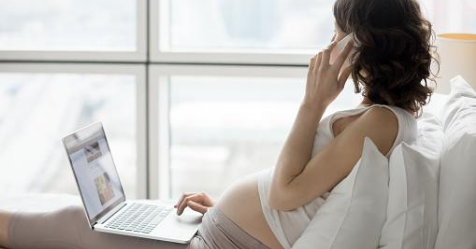|
Pregnancy can be a stressful time. It is common for a woman and her partner to have some degree of stress and anxiety during their pregnancy. The expectant couple can typically worry about the mother’s health and more often, the health of their baby. The Coronavirus pandemic has added further unknowns with respect to health implications for pregnant women and their babies. According to Dr Renée Miller (Perinatal Clinical Psychologist), “recent media attention on the possible increased incidence of stillbirth during Covid-19, has resulted in a further surge of fear in pregnant women and their partners. This is particularly confronting for parents who are pregnant after a previous loss.” The present article aims to address the increased burden of worry faced by expectant parents. I address general concerns surrounding the impacts of Coronavirus during pregnancy. I also highlight limitations associated with the study referred to in the media regarding increased rates of stillbirth during the pandemic. Finally, together with Professor Mark Umstad and Dr Stephen Cole, we provide tips on how to keep you and your baby safe. I’m pregnant. Should I be worried about catching Coronavirus? From the limited evidence to date, pregnant women do not appear to be more severely affected by COVID-19 than the general population. The Royal Australian & New Zealand College of Obstetricians and Gynaecologists (RANZCOG) states that pregnant women do not appear to become more severely unwell if they develop COVID-19 infection than non-pregnant women of the same age. Most pregnant women will experience mild or moderate symptoms including fever, cough, loss of smell, headaches and fatigue. Most of these women will make a full recovery without need for hospital admission (RANZCOG, 2020). I’m pregnant. Will my baby be harmed if I catch Coronavirus? Women should remain reassured, that there is currently no evidence that COVID-19 will harm your baby or cause abnormalities during pregnancy. There is also no evidence to suggest that there is an increased risk of miscarriage with COVID-19 (RANZCOG, 2020). The risk of Coronavirus to a baby appears very small (Stillbirth CRE, 2020). Should I be worried about the reports of increased rates of stillbirths during the pandemic? A recent study in the UK found there was a 4-fold increase in stillbirths during the pandemic period (from February to June 2020). Understandably this finding is frightening for pregnant women. However, it should be noted that there were limitations to this study. These limitations include:
Obstetrician, Dr Stephen Cole emphasizes that none of the fetal deaths in utero occurred in women with known COVID-19. He stated, “it is possible that increased stillbirths may be due to indirect effects such as a hesitation for women to attend the hospital for check-ups, to come in when they are concerned, or due to a reductions in antenatal visits”. While more stillbirth research clearly needs to be done, the UK study also points to possible indirect causes for the rise in stillbirth rates versus a direct link due to Coronavirus. Indirect effects include:
According to Obstetrician, Professor Mark Umstad “It is important to understand that it is still safe to continue attending your care provider during the pandemic. They will have all of the appropriate precautions in place to protect you, including when you attend hospital. While it can be challenging to attend without your usual support team and may be confronting to see clinical staff in their personal protective equipment (PPE), these precautions will keep you and your baby safe during this pandemic." In summary, studies conducted to date have limitations. Clearly more research is needed. What can I do to keep my baby safe? The next section outlines what Midwives and Obstetricians are advising their patients who are concerned about the health of their babies during the pandemic.
Please note: this list is not exhaustive. Please always refer to your health care provider and the advice they give you during your pregnancy. The Coronavirus pandemic has understandably added an extra layer of uncertainty and stress for expectant parents. Try not to jump to conclusions in your own bubble of worry. Trust your healthcare provider. Ask your questions and voice your concerns. Focus on the facts, not on the media. You are not alone in this.  Article written by Eliza Strauss, Bereavement Midwife, Perinatal Loss Educator, and Co-founder of The Perinatal Loss Centre, Melbourne, Australia. Acknowledgments Dr Renée Miller, Perinatal Clinical Psychologist, Founder of Antenatal & Postnatal Psychology Network and Co-founder The Perinatal Loss Centre, Melbourne, Australia. Professor Mark Umstad AM, Obstetrician and Gynaecologist, Frances Perry House, Melbourne, Australia. Dr Stephen Cole, Consultant Obstetrician & Specialist in Maternal Fetal-Medicine, Epworth Healthcare and, Melbourne, Australia. Resources
Centre of Perinatal Excellence (COPE): www.cope.org.au Perinatal Anxiety and Depression Association (PANDA): www.panda.org.au Gidget Foundation: www.gidgetfoundation.org.au Antenatal & Postnatal Psychology Network: www.antenatalandpostnatalpsychology.com.au/covid-19.html References Khalil A, von Dadelszen P, Draycott T, Ugwumadu A, O’Brien P, Magee L. Change in the Incidence of Stillbirth and Preterm Delivery During the COVID-19 Pandemic. JAMA. 2020;324(7):705–706. doi:10.1001/jama.2020.12746 RANZCOG (2020). A message for pregnant women and their families. Retrieved from https://ranzcog.edu.au/statements-guidelines/covid-19-statement/information-for-pregnant-women Still Aware (2020). Safe Sleeping. Retrieved from https://stillaware.org/yourpregnancy/safe-sleep-in-pregnancy Comments are closed.
|
AuthorPosted by Dr Renée Miller Topics
All
|
|
We acknowledge and pay respects to the Elders and Traditional Owners of the land on which our psychologists practise.

 RSS Feed
RSS Feed

